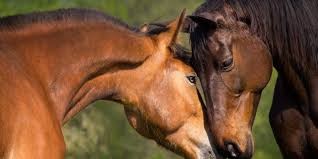
Assessing equine emotional state
As horses are used on a daily basis for work, sport, etc., there is the need to be able to read their emotions. It is important to establish validated indicators of both negative and positive emotions and how horses express those. There have been a lot of studies examining the physiological effects of methods of training and equipment used, however, there is no evidence showing horses emotional reaction to such factors. Recently the Federation Equestre Internationale (FEI) have started to include the term "Happy Athlete" in their rules and are bringing higher importance to the topic.
This study shows evidence for equine emotion and suggests a variety of research tools for assessing the subjective experience in horses. Subjective emotional experience in animals can be identified according to valence (positive-negative, rewarding-punishing, pleasant-unpleasant) and intensity level.
Natural selection shows us some of the underlying features of equine emotion - group composition is very important, stability and behaviour are strongly linked to emotional well being, and this can be very obvious. On the other hand, as pray animals, horses would often mask their emotions in order to survive, this brings the challenge of identifying the signs that can be hidden by horses.
Huge factor that influences both the subjective emotional state and behavioural expression of horses is the horse-human interaction. It is highlighted that 70% of the reported horse accidents in the UK are related to horse`s behaviour. Which is another indicator how helpful and important it is that we understand how to avoid provoking negative emotions in horses. If we understand equine emotions better, we can reduce fear and improve safety.
Expert opinion by Aleksandra Dimitrova
By understanding equine emotions, we can understand equine behaviour better. This can contribute to safer environment for both us and the horses we work with. Understanding horses emotions can also play a big part in equine management, training and hence equine well-being. Even though equine behavioural expressions can be very subtle and often missed, we must continue to strive to understand them better. And this study shows that with monitoring patterns of behaviour, combining evidence from cognitive tests and physiological profiles, we are with no doubt getting closer to understanding the emotional state of the horse.
> From: Hall et al., Appl Anim Behav Sci. 205 (2018) 183-193. All rights reserved to Elsevier B.V.. Click here for the online summary.


